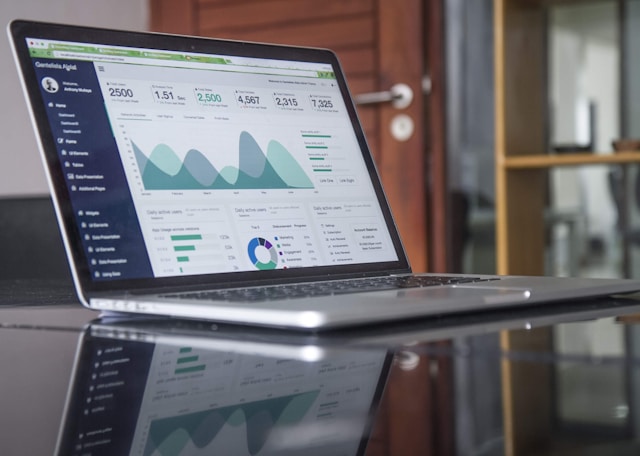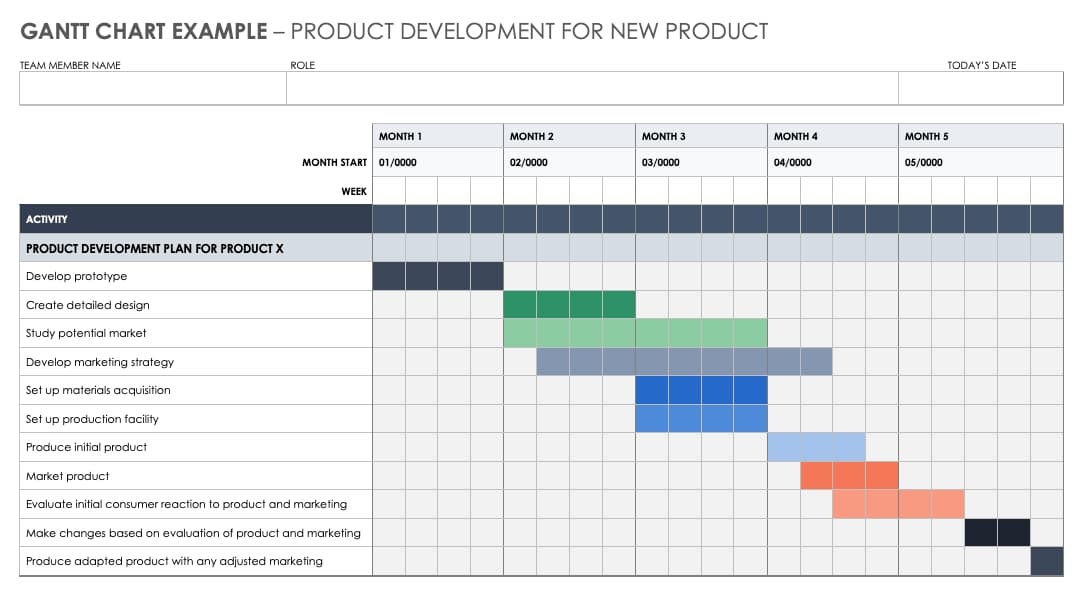In the dynamic realm of online trading and foreign exchange (Forex), the seamless integration of project management frameworks emerges as a pivotal element, enabling the streamlining of operations and amplifying profitability. These sophisticated systems offer a structured and methodical approach to managing trades, monitoring market fluctuations, and conducting in-depth data analysis, ensuring that traders and financial institutions possess the capability to make well-informed decisions swiftly and efficiently. By embracing project management methodologies, traders can optimize their workflows, mitigate risks, and capitalize on market opportunities with enhanced efficacy. Powerful tools such as Gantt charts, comprehensive risk management protocols, and real-time analytical capabilities provide a holistic overview of trading endeavors, allowing traders to meticulously evaluate the performance of their strategies and make necessary adjustments as market conditions evolve.
One of the most significant advantages of leveraging project management systems in the realm of online trading is the ability to maintain a high degree of agility in the volatile Forex market. For instance, renowned platforms like Exness forex trading benefit immensely from the integration of such systems, as they empower traders with the ability to adapt their strategies dynamically, based on real-time data and insights. The seamless integration of project management tools with cutting-edge trading platforms like Exness facilitates a more cohesive and immersive trading experience, where every decision is underpinned by a wealth of analytical data and strategic planning. This synergistic fusion of trading prowess and project management expertise empowers traders to optimize their portfolios, minimize losses, and maximize gains, thereby achieving superior outcomes in the fiercely competitive world of Forex trading.
Overview of Online Trading and Forex
Online trading involves buying and selling financial instruments through an internet-based trading platform. These platforms are offered by brokers and enable traders to interact with global financial markets, including stocks, bonds, commodities, and currencies. Forex trading, or foreign exchange trading, is a subset of online trading that focuses specifically on the buying and selling of currencies. It is the world’s largest financial market, with a vast daily trading volume that significantly surpasses that of stock markets.
Forex trading operates 24 hours a day, five days a week, granting traders from every corner of the globe the unparalleled flexibility to engage in market activities at any time. This remarkable market is decentralized in nature, with trading occurring over the counter (OTC) rather than through a centralized exchange. Traders partake in forex trading with various objectives, including speculating on currency price movements, hedging against international currency and interest rate risks, or strategically diversifying their investment portfolios.
In online forex trading, participants can leverage a wide range of tools and resources to analyze markets, including technical indicators, economic calendars, and real-time news feeds. These tools help traders make informed decisions by providing insights into market trends, economic data releases, and geopolitical events that can affect currency prices.
Brokers play an indispensable role in the realm of online trading, offering advanced platforms that cater to a wide spectrum of trading strategies and styles, ranging from dynamic day trading to long-term investment strategies. They also extend the powerful leverage feature, enabling traders to control substantial positions with a relatively modest amount of invested capital. However, while leverage can amplify potential profits, it also carries the inherent risk of magnifying losses, underscoring the need for prudent risk management practices.
In essence, online trading and forex present a world of opportunities for profit generation and portfolio diversification, yet they also come with inherent risks that necessitate careful navigation. To thrive in this competitive arena, traders must cultivate a profound understanding of market dynamics, formulate clear and well-defined trading strategies, and implement effective risk management practices, ensuring that their endeavors are grounded in sound principles and meticulous planning.
Definition and Characteristics of Project Management Systems
Project management frameworks are sophisticated software applications meticulously designed to facilitate the intricate processes of planning, organizing, executing, and tracking project tasks and resource allocation. These cutting-edge systems provide a structured and methodical framework, empowering project managers and their teams to navigate projects of varying scales and complexities with unparalleled effectiveness. Here are the key characteristics and components that define these powerful project management systems:
- Planning and Scheduling: These systems equip users with the capability to meticulously plan and orchestrate projects by defining tasks, establishing deadlines, and crafting comprehensive project timelines. Advanced features such as Gantt charts and interactive calendars enable the visualization of task sequences and their intricate dependencies, fostering enhanced scheduling and time management strategies.
- Resource Management: These platforms offer robust tools to allocate and manage resources with utmost efficiency, encompassing human capital, budgetary constraints, and material resources. They ensure that resources are optimally utilized, mitigating the risks of over-allocation or underutilization, thereby contributing to the cost-effectiveness and overall efficiency of projects.
- Collaboration and Communication: Effective collaboration forms the bedrock of successful project management. Project management systems provide a suite of collaboration tools that empower team members to seamlessly communicate, share files, and provide real-time updates on progress. These features ensure that all team members are aligned and can work in unison, transcending geographical boundaries.
- Task Delegation and Progress Tracking: Managers are empowered to assign tasks to team members, prioritize objectives, and meticulously track progress through the system. This fosters a culture of accountability and enables managers to monitor task advancement, identify potential bottlenecks, and implement proactive adjustments as needed.
- Documentation and File Sharing: These systems serve as a centralized repository for project-related documents, facilitating easy access, sharing, and version control. This consolidated storage approach ensures consistency and guarantees that all team members have access to the latest information.
- Budgeting and Cost Tracking: Advanced budgeting and expense tracking tools are often integrated into these systems, enabling managers to monitor project costs in real-time, compare them against allocated budgets, and make informed financial decisions accordingly.
- Risk Management: Identifying, assessing, and mitigating risks is an integral feature of project management systems. They provide comprehensive frameworks for managing potential risks to the project’s timeline, quality, or resource allocation, helping teams anticipate and proactively plan for potential challenges.
- Reporting and Analytics: Sophisticated reporting and analytics capabilities empower managers and stakeholders to generate detailed reports on various aspects of the project, including progress tracking, resource utilization, and budget status. These invaluable insights are crucial for strategic decision-making and for assessing the project’s overall success.
- Integration Capabilities: Many project management systems offer seamless integration with other tools and platforms, such as email, calendar, and various business systems, ensuring a streamlined workflow and interconnectivity across all aspects of project management.
In essence, project management systems are comprehensive and indispensable tools that empower organizations to execute projects with unparalleled effectiveness, ensuring timely completion, adherence to budgetary constraints, and the delivery of desired quality standards. These systems are indispensable in today’s complex and fast-paced business environments, where effective coordination and strategic management of resources are pivotal to achieving project success.

Project Management Systems in Optimizing Trading Processes
The fusion of project management frameworks with trading processes heralds a transformative paradigm shift in the manner trading operations are conducted, ushering in a level of discipline and structure that is quintessential for attaining success in the dynamic realm of financial markets. These systems emerge as catalysts in optimizing trading processes by furnishing a comprehensive framework for strategic planning, execution, monitoring, and continuous improvement. In trading, where the stakes are extraordinarily high and the margins for error are razor-thin, the ability to meticulously plan and execute strategies while efficiently allocating resources can prove to be the decisive factor that separates success from failure.
Fostering a Strategic Mindset in Trading
Project management systems cultivate a strategic mindset within trading operations, enabling traders and trading firms to establish clear objectives, formulate coherent strategies, and execute trades in an organized and methodical manner. By defining specific goals, timelines, and risk parameters, traders can align their activities with their overarching investment strategy and risk tolerance profile. This strategic alignment ensures that every trade is an integral part of a cohesive plan, rather than a series of ad-hoc decisions, thereby increasing the likelihood of achieving long-term profitability and sustainable success.
Robust Risk Management Protocols
Furthermore, robust risk management is a critical component of trading that is significantly bolstered by the integration of project management systems. These systems provide a comprehensive suite of tools for identifying, assessing, and mitigating risks, empowering traders to make well-informed decisions and implement strategies that strike an optimal balance between potential rewards and acceptable levels of risk. By establishing predefined risk thresholds and continuously monitoring market conditions and portfolio performance against these benchmarks, traders can swiftly adapt their strategies in response to evolving market dynamics, thereby safeguarding capital and maximizing returns.
Optimized Resource Allocation
Resource allocation is another pivotal area where project management systems add immense value to trading processes. They enable traders to efficiently allocate capital, time, and human resources, ensuring that these invaluable assets are judiciously utilized in areas where they are most likely to generate optimal returns. This is of paramount importance in trading, where misallocation of resources can lead to missed opportunities or unnecessary exposure to risk. By providing a holistic overview of resource allocation and utilization, project management systems empower traders to make informed decisions that maximize the efficiency and effectiveness of their operations.
The significance of integrating project management systems into optimizing trading processes cannot be overstated. They provide the structure, tools, and insights necessary for traders to navigate the intricate complexities of the financial markets with unwavering effectiveness. By enhancing strategic planning, risk management, resource allocation, and decision-making processes, project management systems empower traders to achieve greater consistency, efficiency, and profitability in their trading operations. As the trading environment continues to evolve at an unprecedented pace, the adoption of these systems will likely become an increasingly integral component of success for trading professionals and firms alike.
Importance of Project Management in Trading and Forex
The integration of project management principles into the realms of trading and Forex trading holds profound significance, as these disciplines necessitate an unwavering commitment to precision, strategic planning, and comprehensive risk management strategies. Despite the seemingly divergent nature of project management and financial trading, the application of project management methodologies can substantially elevate the efficiency and effectiveness of trading operations. Here’s why project management is an indispensable component of success in trading and Forex:
- Strategic Blueprint: Project management empowers traders and trading firms to approach their trading endeavors with a well-defined strategic framework, establishing clear objectives, delineating risk parameters, and instituting systematic processes for executing trades. This strategic approach fosters alignment between trading activities and broader financial goals, while ensuring adherence to predefined risk tolerance levels.
- Risk Mitigation Protocols: One of the core tenets of project management is the identification, assessment, and mitigation of risks. In the realms of trading and Forex, effective risk management is paramount. Project management methodologies equip traders with the ability to systematically identify potential risks, evaluate their impact, and formulate robust strategies to mitigate them, thereby safeguarding capital and optimizing returns.
- Resource Optimization: Effective resource allocation is a critical success factor in trading, where resources encompass capital, human expertise, and cutting-edge information technology. Project management systems ensure that these invaluable resources are utilized efficiently, avoiding over-leverage and ensuring that trading strategies are well-supported and sustainable.
- Process Streamlining: Trading involves a myriad of intricate processes, including research, analysis, trade execution, and performance review. Project management principles facilitate the streamlining of these processes, ensuring that each step is carried out with efficiency and consistency, which is vital for maintaining a competitive edge in the fast-paced trading environment.
- Performance Monitoring and Evaluation: Project management systems provide powerful tools for monitoring performance against predefined goals and metrics. In the context of trading, this translates to tracking the performance of trading strategies, adherence to risk management protocols, and profitability. This ongoing evaluation enables traders to refine their approaches and make informed adjustments to improve future outcomes.
- Collaborative Synergy: Trading endeavors often involve teams, especially within larger institutions. Project management facilitates effective collaboration and communication among team members, ensuring that everyone is aligned with the overarching trading strategy and objectives, and that decision-making is informed and timely.
- Adaptability and Continuous Improvement: The trading landscape is inherently dynamic, necessitating constant adaptation. Project management principles foster a culture of continuous improvement and agility, enabling traders and firms to adapt their strategies in response to market fluctuations and lessons learned from past performance.
By seamlessly integrating project management principles into trading and Forex operations, traders and firms can achieve a more disciplined, structured, and strategic approach to their trading activities, leading to enhanced decision-making capabilities, robust risk management protocols, and ultimately, superior financial outcomes.
Selecting the Right Project Management System for Trading Needs
Selecting the right project management system for trading needs involves understanding both the unique requirements of the trading environment and the specific features offered by various project management tools. Here are key steps and considerations for choosing a project management system that aligns with trading needs:
Identify Specific Trading Needs
First, clearly define what you need the project management system to do in your trading context. Are you focusing on risk management, strategy execution, trade monitoring, or all of these? Understanding your specific requirements will guide you in selecting a system that offers the relevant features.
Ease of Integration
The chosen system should seamlessly integrate with existing trading platforms and data analytics tools. Integration is crucial for real-time data exchange and for ensuring that trading decisions are informed by the most current and comprehensive data available.
Real-Time Collaboration Features
In trading, conditions change rapidly, and the ability to collaborate in real time is vital. The project management system should support instant communication, file sharing, and real-time updates to facilitate swift decision-making and adjustments to trading strategies.
Risk Management Tools
Given the importance of risk management in trading, look for a system that offers robust tools to identify, assess, and mitigate risks. This includes features for setting risk thresholds, monitoring exposure levels, and generating alerts for predefined risk indicators.
Customizability and Scalability
The system should be flexible enough to tailor to your specific trading strategies and scalable to grow with your trading operations. Customizable dashboards, reports, and alerts can greatly enhance the system’s utility in a trading context.
User-Friendliness
The interface should be intuitive and user-friendly. Traders and team members should be able to use the system effectively without extensive training, ensuring that more time is spent on trading activities rather than navigating complex software.
Security and Reliability
Due to the sensitive nature of trading data, the project management system must be secure and reliable, with robust data encryption, secure login mechanisms, and consistent uptime to ensure that trading activities are not compromised.
Performance Tracking and Reporting
Look for a system that offers detailed performance tracking and reporting capabilities. Being able to analyze past trades and strategies against performance metrics is vital for refining trading approaches and enhancing profitability.
Vendor Reputation and Support
Consider the reputation of the software provider, especially their track record in terms of system reliability, customer support, and updates. Good vendor support can be crucial in resolving any issues that may arise and in helping you make the most of the system’s features.
Trial Periods and Demos
Before committing, take advantage of trial periods or request demos to test the project management systems in real-world trading scenarios. This hands-on experience can be invaluable in assessing whether the system meets your specific trading needs.
By carefully evaluating these aspects and choosing a project management system that aligns well with the specific demands and dynamics of trading, you can enhance your trading efficiency, effectiveness, and ultimately, your trading success.
Conclusion
The integration of project management systems into trading and Forex operations represents a strategic approach that can significantly enhance the efficiency, effectiveness, and overall success of trading activities. These systems provide a structured framework for strategic planning, risk management, resource allocation, and performance evaluation, which are crucial components in the highly volatile and fast-paced trading environment.
By adopting the right project management system, traders and trading firms can benefit from improved strategic alignment, enhanced decision-making processes, optimized risk management, and increased operational efficiency. The system’s ability to facilitate real-time collaboration, provide in-depth analytics, and offer customizable features enables trading entities to adapt swiftly to market changes and maintain a competitive edge.
Selecting the appropriate project management system requires a thorough understanding of one’s specific trading needs, an evaluation of the system’s integration capabilities, its tools for collaboration and risk management, and the reliability and support provided by the vendor. When successfully implemented, a project management system can be a powerful tool that supports the dynamic needs of trading professionals, helping them to achieve their strategic objectives and maximize their trading performance in the complex world of financial markets.
Ultimately, the thoughtful integration of project management principles and tools into trading and Forex is not just about managing projects; it’s about strategically managing investments, risks, and opportunities in a way that drives toward financial success and sustainability in the trading industry.









